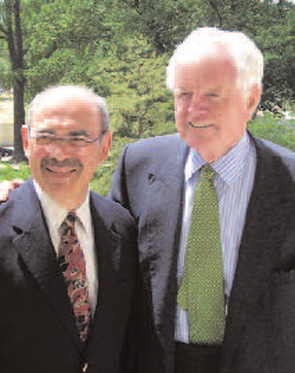
Yes, that’s me with Senator Edward M. “Ted” Kennedy (D-Mass.) in Washington, D.C., this past May (at right). As we reported in The Rheumatologist last month, members of the ACR board of directors and I spent the morning of May 10 meeting with our members of Congress on Capitol Hill. Our visits were well received, and we met with representatives or their staff from over 60 offices. It was an opportunity to talk about the issues of importance to rheumatology, and yes, for a photo or two.
Access to a sitting senator, and one of such esteem and influence (whatever your politics may be), doesn’t always come easy. We were able to arrange this meeting because of a personal contact of mine who knows the senator’s former chief of staff. But our meeting with Sen. Kennedy was more than just a photo op: this 45-year veteran of politics spent more than thirty minutes with us, keenly aware of the issues facing medicine and the patients we treat. At the end of our meeting, he even asked for our opinion on the issue of follow-on biologics (aka generic biologics).

Why I Care so Much
In June, I spoke about why I still like being a rheumatologist – the “still” being in reference as much to the current environment of medicine and all of its hassles as it was to my three decades of being in practice. That column touched a chord with many of you, and you took time out of your day to write me and tell me why you still like being a rheumatologist. Many of you also touched on the hassles of practicing medicine today, and lamented that it didn’t seem like it was going to change any time soon.
I’m often asked why I spend time volunteering for the ACR and organized medicine. It’s enlightened self-interest more than anything: it is unlikely that anyone will look out for me better than I can look out for myself. I have to be a part of trying to make positive changes in medicine, for rheumatology and for our patients. I don’t see it as a choice, and it is not in me to abdicate this responsibility to others.
You see, the solution to these issues lie in our ability to effectively (and tirelessly) advocate. It’s an inescapable part of our existence in today’s world. The world is divided into two kinds of people: observers and participants. As a rheumatologist or a healthcare professional, if you’re complaining about the state of medicine today, you need to be a participant in the efforts to address and resolve these issues.

